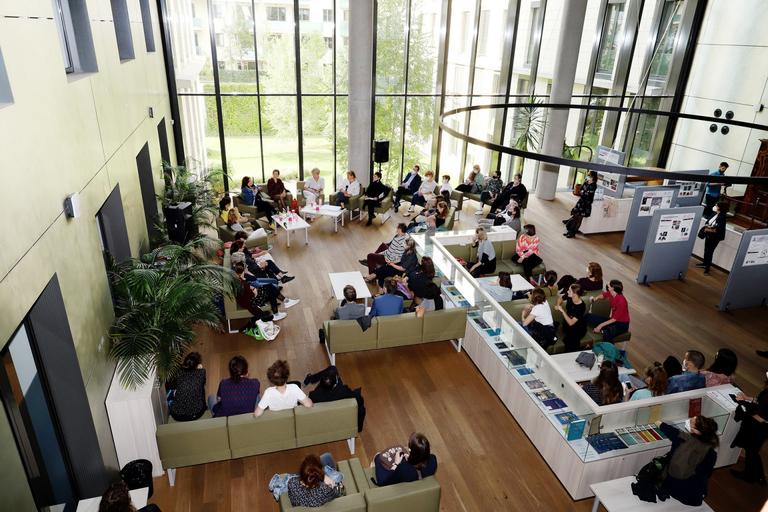Please note that the Workshops will be held in Hungarian. English interpretation will not be provided.

Connections Between Art History and Museum Education
Date: Friday, September 26, 2025, 11:40 AM – 1:20 PM
Location: HTK Gallery
This roundtable focuses on the close relationship between contemporary museum education practices and training in art history. Each participant has studied art history, and during their education, they encountered the interdisciplinary nature of museum pedagogy. Over time, museum professionals have recognized and emphasized that dismantling disciplinary boundaries strengthens the social embeddedness of cultural institutions. Today, curators, museum educators, community outreach coordinators, digital curators, communication experts, exhibition designers, and audience researchers collaborate more closely than ever. Increasingly, museum teams and external experts co-develop exhibitions, working together from the planning stage to interpret and highlight the meanings embedded in artworks. In this process, museum educators play a key role: they balance knowledge transfer and engaging experiences by combining methodological tools with their art historical expertise.
Discussion topics include:
- Is it possible to have meaningful museum education without a well-founded art historical perspective?
- How does inclusive museum practice inspire contemporary museum education?
- What are the key components of a museum educator’s professional identity?
Moderator: Kinga German, Associate Professor, Art Historian
Participants:
- Piroska Földváry, Director, Art Historian, House of the Millennium – NEO Contemporary Art Space
- András Vereckei, Museum Educator, Art Historian, Christian Museum, Esztergom
- Barbara Nagy, Museum Educator, Curator, Art Historian, Ludwig Museum
- Dóra Borsai, Museum Educator, Art Historian, Museum of Applied Arts – Hungarian National Museum Public Collection Center
- Eszter Marina, Museum Educator, Art Historian, Museum of Fine Arts
Theoretical and Practical Issues in Restoring Art Nouveau Buildings
Presentation and Roundtable organized by the Museum of Applied Arts
Date: Friday, September 26, 2025, 9:30 AM – 11:10 AM
Location: HTK Gallery
The iconic building of the Museum of Applied Arts, a hallmark of Hungarian Art Nouveau, has been closed since 2017. The reconstruction of this building—and of Art Nouveau heritage in general—raises unique, style-specific questions that are rarely addressed in public discourse.
One such occasion was the international conference titled Restoring Art Nouveau hosted by the museum in November 2017, organized as part of the Interreg DTP project Protecting and Promoting Art Nouveau Heritage in the Danube Region. In November 2024, the international conference Bringing Art Nouveau Heritage Back to Life: Theory and Practice in Restoration. From the Venice Charter to the Turin Declaration in Brussels brought together architects, architectural historians, art historians, and restorers to discuss the topic further. The Museum of Applied Arts played a key role in organizing this event as a consortium partner of the Art Nouveau as a New EUtopia (Creative Europe, 2024–2027) project. Several Hungarian experts featured in that conference will also participate in this Látkép roundtable discussion. Together, we will explore both the reconstruction of the museum building and the broader theoretical and practical issues surrounding the restoration of Art Nouveau architecture.
Moderator: Júlia Katona, Art Historian, Museologist, Scientific Secretary and Research Project Leader, Museum of Applied Arts
Participants:
- Tamás Csáki, Art Historian, Kiscell Museum, Budapest History Museum, Modern Urban History Department
- Kornélia Hajtó, Ceramics Restorer, Department of Conservation and Restoration, MNM Public Collection Center
- Brigitta Kürtősi DLA, Painting Restorer, Department of Conservation, Hungarian University of Fine Arts
- János Mangel DLA, Architect, Vikár and Lukács Architecture Studio
- József Sisa, Art Historian, ELTE HTK Institute of Art History
Blind Spot – Art History Disappearing
Date: Thursday, September 25, 2025, 5:10 PM – 6:50 PM
Location: HTK Gallery
In 2021, the Látkép Festival section “Useless Art History?” addressed pressing questions about the discipline and its professional practice. The call for papers at the time concluded with the question: Why would someone study art history, or want to become an art historian in Hungary today? Four years later, this question is more relevant than ever—the situation has worsened, and now we must ask where and how one can even study art history.
The dismantling of art history education at the secondary school level not only threatens the profession’s future, but also contributes to the loss of essential knowledge and competencies that are integral to culture and general literacy. A lack of professional engagement with built, visual, and material heritage leads to historical blindness and visual illiteracy.
This roundtable will explore these issues and discuss what options art historians have today to improve this situation.
Moderator: András Zwickl, Art Historian, Moholy-Nagy University of Art and Design (MOME)
Participants:
- Emese Révész, Art Historian, Institute of Art History, ELTE
- Attila Horányi, Art Historian, MOME
- Ádám Albert, Visual Artist, Hungarian University of Fine Arts
- Tamás Don, Curator, MODEM
- Zsuzska Mészáros, Visual and Environmental Culture Teacher, Budapest Fazekas Mihály High School
“F” for Fake – Challenges of Art Forgery from the Perspectives of Gallerists, Art Historians, and Restorers
Date: Saturday, September 27, 2025, 4:30 PM – 6:30 PM
Location: HTK Gallery
Fake paintings mislead not only buyers and sellers but also endanger the integrity of art historical scholarship. Adding forged signatures to old artworks, removing original markings, overpainting, and “value-adding” modifications have long been part of the Hungarian art market. Even well-intentioned collectors and institutions can fall victim to forgeries by acquiring, exhibiting, or publishing them. In this discussion, three experts who have been confronting fakes for decades will offer insight into this secretive world: how they investigate and expose forgeries. The conversation will touch on common types of forgeries, notorious cases, famous forgers, and the challenges of detection. Participants will also receive practical advice to help them navigate the deceptive world of art fakes.
Participants:
- Péter Nemes, Art Historian, Art Dealer
- Gyula Kemény, Restorer
- Péter Molnos, Art Historian

